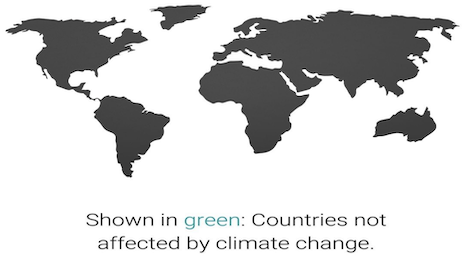 An image on the global effect of climate change. Image credit: UN Climate Change
An image on the global effect of climate change. Image credit: UN Climate Change
Despite 192 countries making bold environmental promises under the 2015 Paris Agreement, current climate commitments would put the world on track for a temperature increase of 2.7 degrees Celsius during this century, according to a recent McKinsey report.
Global decarbonization efforts are in full swing, and countries worldwide are attempting to offset the climate warming effects of their businesses and means of production. Report findings show that reducing public-sector emissions could be an integral component of most national decarbonization strategies.
Cutting carbon through culture shifts
In the public sector, ongoing pressure to adopt sustainable organizational strategies is feeble since limited competition among public services leaves stakeholders with weak leverage to demand increased sustainability. However, a failure to adopt environmentally-friendly strategies among public sector entities can have a negative domino effect on overall decarbonization efforts.
The report highlights four ways for public entities to decarbonize their operations and become more sustainable. Through decarbonizing buildings, creating more sustainable travel policies, integrating ESG goals and promoting new workforce behavior, corporations and governments alike could positively influence emissions targets.
Decarbonizing buildings could be as simple as improving insulation, prioritizing the use of LED lights and swapping oil and gas boilers with heat pumps. Energy consumption can also be reduced by employing light and temperature control sensors and installing green roofs, which have the added benefit of improving water management.
View this post on Instagram
An image promoting climate action and personal responsibility
Public sector agencies can also adjust their travel practices with sustainability in mind. By encouraging flight classes with lower carbon footprints, using sustainable hotels and replacing flights with train travel, organizations could minimize their impact on the Earth.
Introducing new environmental, social and governance (ESG) goals into internal processes is a great starting point for businesses to evolve into new norms. For supply strategies, a great route for reducing carbon is selecting local service providers and updating their supplier codes of conduct to promote sustainability at all levels of the organization.
The world’s public sector accounted for about 33 percent of the global workforce in 2021. As a result, tweaking employee behavior by promoting zero-emissions vehicles for commutes, incentivizing recycling and power conservation and popularizing cycle-to-work campaigns could promote change on a macro level.
Luxury carbon nuetrality
Sustainability is not just an abstract goal for governments and public agencies, as luxury brands and retailers are making powerful decisions to reduce their environmental impacts this year.
New York department store Bergdorf Goodman has transitioned to renewable energy and eliminated its use of natural gas (see story). In the same vein, French jeweler Cartier has joined the CEO Carbon Neutral Challenge, a call-to-action coalition formed in 2019 by Gucci president and CEO Marco Bizzarri (see story).
Moreover, LVMH's Louis Vuitton teamed up with carbon-negative materials company Origin Materials to develop low-carbon footprint packaging for its beauty division's products (see story).
In the auto industry, limiting carbon emissions and creating more Earth-friendly products are also top of mind. German automaker Audi has announced that beginning in 2026, it will exclusively manufacture electric vehicles (see story).